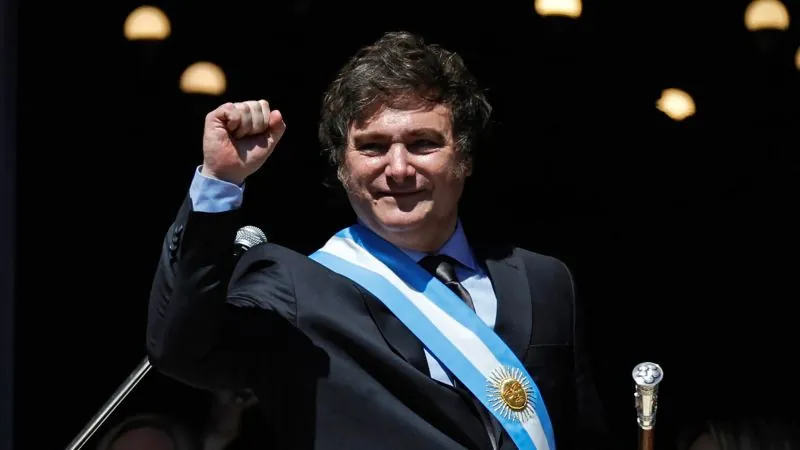
Argentina's Economic Gamble: Milei's Chainsaw Strategy a Year Later
2024-12-10
Author: Chun
Introduction
It's been one year since Javier Milei claimed the presidency of Argentina, promising to tackle the chronic hyperinflation and economic turmoil that plagued the nation. His radical approach—dubbed the "chainsaw" method—aimed at significantly reducing the size and spending of the government has yielded mixed results. His drastic measures have attracted the attention of various international figures, including advocates from former President Donald Trump’s administration, eager to replicate Milei's governmental efficiency tactics.
Economic Achievements
Under Milei's libertarian leadership, Argentina has seen something unprecedented: consecutive monthly budget surpluses, a feat highlighted by the International Monetary Fund (IMF) as a significant achievement. Inflation has sharply declined—down to 2.7% in October from an astronomical 25.5% when he took office. Nevertheless, these results come with a grim backdrop; poverty levels have skyrocketed, exceeding 50%, and the economy, the third largest in Latin America, is embroiled in a deepening recession.
Human Impact
The human cost of Milei's aggressive reforms cannot be overstated. Local charity providers, like Natalia Burone, report increased demand for food assistance, stating, “There is growing desperation because people have nothing to eat.” The IMF predicts Argentina's GDP will contract by 3.5% this year, continuing a disturbing trend that began with a 1.6% downturn last year. Even the projected 5% growth for next year will barely offset these losses.
Austerity Measures
Milei's approach includes severe cuts: reducing the number of government ministries from 18 to 8, terminating over 30,000 public sector jobs, and stripping away energy and transport subsidies. The impact hasn't gone unnoticed. Public transport fares in Buenos Aires surged from 70 pesos (around 7 cents) to prices unaffordable for many, highlighting the strains of sudden austerity.
Public Sentiment
Despite these significant hardships, Milei’s popularity endures. Polls indicate that many Argentines trust his claim that conditions will worsen before they improve. Matteo Maffia, a local communications consultant, remarked on the newfound stability in prices, saying it feels "completely new." Businesses are reportedly shifting from day-to-day survival to longer-term planning, suggesting a cautious optimism among entrepreneurs.
Ongoing Challenges
But challenges remain. The peso is perceived as overvalued, hindering Argentina’s external competitiveness. Economists warn that without a weaker currency, sustainable economic growth remains elusive. Milei’s administration has revised its currency devaluation strategy, but international investors are wary, eager for signs of a substantial turnaround.
Diplomatic Relations
Compounding the uncertainty, Milei's diplomatic style is volatile. His abrasive commentary on international leaders has raised eyebrows and led to tensions with key trading partners, including Brazil, whose President he labeled a “communist.”
Future Prospects
On a more positive note, a recent free trade agreement with the European Union could open doors for growth and better relations with neighboring countries. For many Argentines, this precarious balance of hope and fear seems to define the current moment.
Conclusion
Feedback from citizens remains mixed, yet increasingly positive. Diego Fenoglio, an entrepreneur, noted that if the administration maintains its course, "this country will be unrecognizable" within a few years. As Argentina navigates these turbulent waters, the public continues to grapple with the implications of Milei's chainsaw approach—a high-stakes gamble that may either fortify the nation or further entrench its socioeconomic challenges.

 Brasil (PT)
Brasil (PT)
 Canada (EN)
Canada (EN)
 Chile (ES)
Chile (ES)
 España (ES)
España (ES)
 France (FR)
France (FR)
 Hong Kong (EN)
Hong Kong (EN)
 Italia (IT)
Italia (IT)
 日本 (JA)
日本 (JA)
 Magyarország (HU)
Magyarország (HU)
 Norge (NO)
Norge (NO)
 Polska (PL)
Polska (PL)
 Schweiz (DE)
Schweiz (DE)
 Singapore (EN)
Singapore (EN)
 Sverige (SV)
Sverige (SV)
 Suomi (FI)
Suomi (FI)
 Türkiye (TR)
Türkiye (TR)